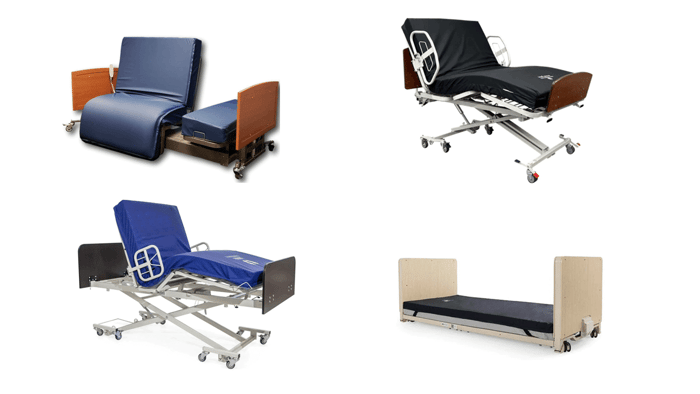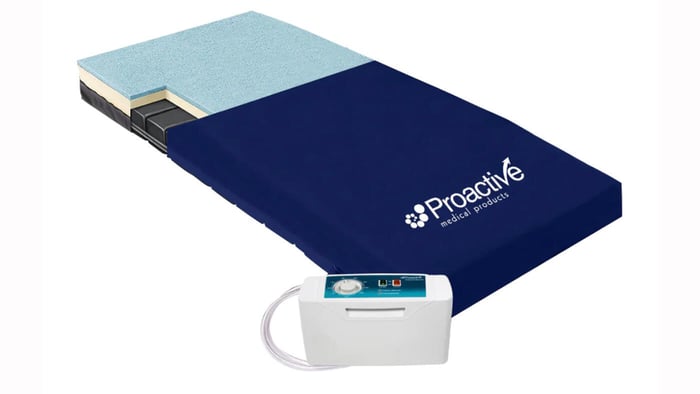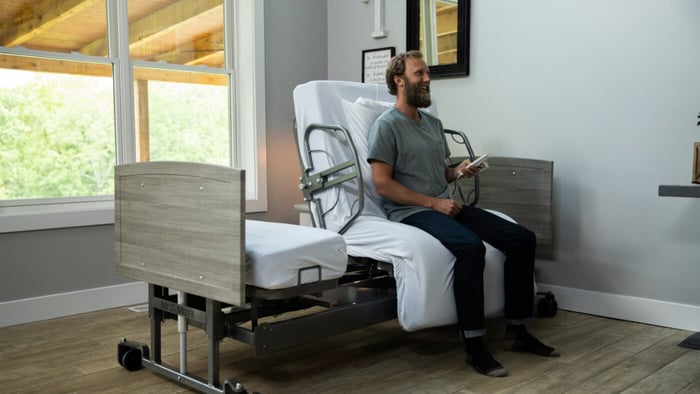Finding the Right Hospital Bed for Alzheimer's and Dementia Patients
Alzheimer's is the most common cause of forgetfulness and dementia in the elderly. It usually affects people over the age of 65. Where it alters the memory, behavior, and thinking abilities of a person, it also makes the patients liable to certain risks and hazards, one of which is the increased tendency of falling. Therefore, Alzheimer's and dementia patients require an extra level of care at home.
Finding the right hospital beds for such patients is as much important as taking any other safety measures in this regard. However, choosing one often gets difficult especially when a large variety of beds are available, and you don’t know exactly what qualities should be in the bed for people at increased risk of falling.
Express Hospital Beds offer beds that are best suitable for people having dementia problems. This blog will help you find the right bed for your loved ones with Alzheimer’s or dementia problems. But before that, let’s understand the importance and need for extra care for these patients.
Why Alzheimer's and Dementia Patients Are at Greater Risks of Falling?
Although people in old age have an increased tendency to fall due to weakness, the risks are even higher in people having Alzheimer’s and other dementia-related disorders. A group of researchers has found that elderly people with Alzheimer’s have 2 to 8 times greater risks of falling. [1]
Many factors are responsible for it. Apart from muscle weakness, such patients face problems with mobility and balancing. [2] Moreover, the disease also affects that part of the brain which is responsible for visual-spatial processing i.e. distance and depth perception. As a result, the person is unable to tell where and how far the objects are. [3] They even lose awareness about their body parts.
Besides, these patients are often taking anti-psychotic and antihypertensive medications which may sometimes induce lightheadedness, dizziness, and fainting/blackout (due to orthostatic hypotension) all of a sudden making the person fall on the ground. [4] Other factors include gait problems, memory impairment, poor judgment, and psychological or behavioral symptoms of dementia. [5] All these things increase the risks of falling in Alzheimer’s and dementia patients.
Which Problems May Occur if an Alzheimer’s Patient Suffers from a fall?
If seniors with dementia disorders like Alzheimer’s disease are not taken care of properly and they suffer from a fall, the following problems may arise;
Ø Fractures
A study, published in the journal Geriatric Orthopedic Surgery and Rehabilitation, claims that the risks of getting a hip fracture following a fall are 3 times greater in Alzheimer's patients as compared to people with intact cognitive functions. [6]
This increased preponderance of fractures is because such patients are usually old, have decreased muscle mass and strength, do less physical activities, and have conditions like osteoporosis, vitamin D deficiency, etc. All these factors make their bones weak and easily prone to fractures. [7, 8, 9]
Ø Extreme Pain
Fractures are very painful, especially for elderly people due to lower thresholds of pain. The same goes for dementia patients. Pain can further aggravate the dread of the condition.
Ø Hospitalization
Broken bone following a fall will necessitate hospitalization and surgery for the patient. This not only adds further disorientation and disability but also puts a lot of strain on your pocket to pay for the hospital expenses of your loved ones. Moreover, there will be higher chances that the patient will no longer be able to be cared for at home.
Ø Increased Mortality
Clinical evidence has shown that Alzheimer's patients, who have suffered from a fracture and have undergone surgery for that, have higher morbidity and mortality rates and are more likely to die earlier. [10]
All this can happen due to mere negligence in the care of Alzheimer's and dementia patients. That’s why; you have to be extra vigilant about caring for your loved one having such a condition.
Choose Hospital Beds Wisely
Research says that almost half of the falls in Alzheimer's patients occur at home, and 28% of such severe incidents happen when the patient is getting into or rolling out of bed, or being shifted to or from a bed. [11]
Therefore, where you are supposed to take care of everything, from mere removing things from the floor on which patients can trip over, to installing handrails and lights for safe walking, or using non-slip mats in bathrooms, etc, you should also choose the bed for your loved one wisely.
Which Hospital Bed is Best Suitable if your Loved One Has Alzheimer’s?
Express Hospital Beds have taken into account all such potential risks and hazards, and have designed the right beds for elderly patients with memory issues who are prone to falls due to their illnesses.
Express Hospital Beds recommend Hi-Low Beds for Alzheimer's and dementia patients due to the following beneficial properties;
Ø Total remote control adjustments
These beds have the same features of a fully functional electric bed having remote control adjustments of the height of the entire bed as well as that of the head and foot-ends. No physical strength is required for this purpose.
Ø Low height means fewer risks of falling
The best thing about Hi-Low beds which favors the safety of Alzheimer's patients is the height of these beds. The bed deck is only 7 inches from the ground and even after putting a 6-inch thick mattress over it, the height of the bed does not exceed 13 inches. This improves the safety along with the comfort of the patients.
Moreover, the patient can sit on the side of the bed with his/her feet resting flat on the ground. It also makes getting into or out of bed easier which is usually very troublesome in the case of other types of hospital beds.
Ø Reduced risks of injuries
With that much height of the bed, the risks of serious injuries are significantly reduced even if the patient falls/rolls out of bed. This can further get better by adding a fall mat alongside the Hi-Low Beds.
Ø Additional Assistance in Standing
Lastly, a Hi-low bed has the property to rise automatically when the patient is standing or getting out of the bed. It provides extra support and assistance to the person.
The only disadvantage is that Hi-Low beds are a bit more expensive than full-electric beds. However, the safety and care offered by these beds to Alzheimer’s and dementia patients are worth the money.
Note:
Express Hospital Beds a whole variety of Hi-Low Hospital beds with customizable sizes, shapes, colors, and optional rails, mattresses, and battery backups. Click here to get a suitable hospital bed for your loved ones.
References
1. Allan LM, Ballard CG, Rowan EN, Kenny RA. Incidence and prediction of falls in dementia: a prospective study in older people. PloS one. 2009 May 13;4(5):e5521.
2. van Dijk PT, Meulenberg OG, Van de Sande HJ, Habbema JD. Falls in dementia patients. The Gerontologist. 1993 Apr 1;33(2):200-4.
3. Olsson RH, Wambold S, Brock B, Waugh D, Sprague H. Visual spatial abilities and fall risk. Journal of Gerontological Nursing. 2005 Sep 1;31(9):45-51
4. Horikawa E, Matsui T, Arai H, Seki T, Iwasaki K, Sasaki H. Risk of falls in Alzheimer’s disease: a prospective study. Internal Medicine. 2005;44(7):717-21.
5. Suzuki M, Kurata S, Yamamoto E, Makino K, Kanamori M. Impact of fall-related behaviors as risk factors for falls among the elderly patients with dementia in a geriatric facility in Japan. American Journal of Alzheimer's Disease & Other Dementias®. 2012 Sep;27(6):439-46.
6. Friedman SM, Menzies IB, Bukata SV, Mendelson DA, Kates SL. Dementia and hip fractures: development of a pathogenic framework for understanding and studying risk. Geriatric orthopaedic surgery & rehabilitation. 2010 Nov;1(2):52-62.
7. Weller I, Schatzker J. Hip fractures and Alzheimer's disease in elderly institutionalized Canadians. Annals of epidemiology. 2004 May 1;14(5):319-24.
8. Poehlman ET, Dvorak RV. Energy expenditure, energy intake, and weight loss in Alzheimer disease. The American journal of clinical nutrition. 2000 Feb 1;71(2):650S-5S.
9. Sato Y, Asoh T, Oizumi K. RETRACTED: High prevalence of vitamin D deficiency and reduced bone mass in elderly women with Alzheimer’s disease
10. Bai J, Zhang P, Liang X, Wu Z, Wang J, Liang Y. Association between dementia and mortality in the elderly patients undergoing hip fracture surgery: a meta-analysis. Journal of orthopaedic surgery and research. 2018 Dec;13(1):1-8.
11. Tips for Preventing People Living with Dementia from Falling Out of Bed - SafelyYou [Internet]. SafelyYou. [cited 9 August 2022]. Available from: https://safely-you.com/blog/dementia-and-falling-out-of-bed/#:~:text=People%20who%20are%20living%20with,dementia%20falling%20out%20of%20bed.





